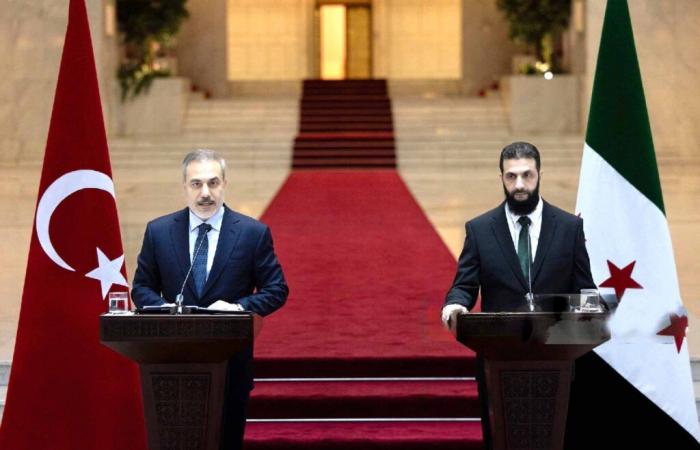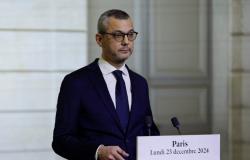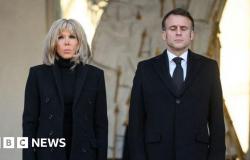It's an open secret: Turkey played a key role in the fall of Bashar Al Assad's regime thanks to the support provided by Ankara to the Syrian opposition. Turkey had direct ties with Hayat Tahrir Al Sham (HTS), the Islamist group that led the armed coalition that toppled Al Assad. What's more, it has hosted several opponents and a number of Syrian political organizations who were forced into exile during the civil war to flee the abuses of the Syrian regime.
Opposition media also broadcast from Turkey. Furthermore, it should be remembered that of the 6.6 million Syrian refugees recorded by the UN who have fled Syria since 2011, Turkey has welcomed 3.6 million on its territory. It is also important to mention the pro-Turkish militias fighting Kurdish forces in northern Syria.
In an interview with France 24, broadcast on Friday, the head of Turkish diplomacy, Hakan Fidan, said that when he was head of the Turkish intelligence services, he had established close contacts with Ahmad Al Sharaa alias Abou Mohammad Al Joulani, the head of Hayat Tahrir Al Sham. “HTS has been cooperating with us for years to gather intelligence on Daesh and Al Qaeda-linked organizations. (…) He had been a great help,” he assured. For his part, Ahmad Al Sharaa declared on Wednesday, in an interview with the Turkish pro-government daily Yeni Safak, that his government will maintain a “strategic relationship” with Ankara, reports AFP.
“An unfriendly takeover”
A few days ago, on December 16 to be precise, Donald Trump made a statement saying: “Turkey made an unfriendly takeover without many lives being lost.” He was referring precisely to the role played by Ankara behind the scenes in the ousting of Al Assad. “It would be a serious mistake to characterize what is happening in Syria as a takeover,” replied Turkish Foreign Minister Hakan Fidan in an interview with Al Jazeera broadcast on Thursday. “For the Syrian people, this is not a takeover.
It is the will of the Syrian people that takes precedence today,” he insisted. “That would be the last thing we would want to see, because we learn important lessons from what happened in our region, because the culture of domination itself has destroyed our region,” added the leader of Turkish diplomacy. “This is why cooperation is essential. Not Turkish domination, not Iranian domination or Arab domination, but cooperation,” he insisted. “Our solidarity with the Syrian people should not be characterized or defined today as if we were governing Syria. I think that would be a mistake,” Mr. Fidan further clarified.
And as if to indicate that Ahmad Al Sharaa, the new Syrian leader, is not a puppet in the hands of Erdogan, Turkey did not immediately send officials to meet the new authorities in Damascus. She waited for Western chancelleries to get the ball rolling. Thus, after the United Kingdom, Germany, France and the United States, Turkey has finally decided to send its Minister of Foreign Affairs who only met his former collaborator yesterday. Before him, “the head of the Turkish intelligence services, Ibrahim Kalin, went to Damascus on December 12, a few days after the fall of Syrian leader Bashar Al Assad. He was filmed leaving the Umayyad mosque in Damascus, surrounded by bodyguards,” reports AFP. According to a Western analyst cited by the French agency, “Ankara already has more influence in Damascus than it has ever had since 1920.”
Ankara does not rule out military intervention
If it denies having played a leading role in the overthrow of the Al Assad regime, the fact remains that Turkey keeps a very vigilant eye on the political and institutional transformations which are sure to accelerate in Syria. The main concern of the Turks is to control possible excesses on the Kurdish side. Hakan Fidan made it clear that as long as the new Syrian leaders controlled the Kurdish forces and their autonomous administration in northern Syria, Turkey would not intervene militarily on Syrian soil. “There is now a new administration in Damascus. I think they are primarily concerned (…). So I think that if they deal with this problem properly, we will have no reason to intervene,” he said, according to comments reported by AFP.
In this same interview broadcast Friday by France 24, Hakan Fidan said a little more about Turkey's intentions regarding the Syrian Kurdish territories, knowing that 12% of the Syrian population is Kurdish. Mr. Fidan recalled what Turkey has always proclaimed, namely that all the Kurdish political and military forces and organizations active in Syria, whether the PKK, the Kurdish Labor Party, its historical enemy, or the People's Protection Units (YPG, according to the Kurdish acronym) or the Syrian Democratic Forces (SDF), are “terrorist” organizations. “The YPG is a terrorist organization artificially created by people from Turkey, Iraq, Syria and some European countries. I think this artificial terrorist organization should be dismantled immediately,” he insisted.
And continued: “There is a new administration in Syria at the moment. I think she should take care of this matter. Syria's territorial integrity and sovereignty demand it. It has to be done,” he persisted, before warning: “But if that doesn’t happen, then of course we have to protect our own national security.” Hakan Fidan clearly does not rule out military intervention in Syria. “Whatever is necessary will be done,” he warned. But he still favors the political solution “because there is now a new administration in Damascus. Russia, Iran and the Al Assad regime are no longer behind the YPG/PKK,” he rejoiced.
On Friday, Recep Tayyip Erdogan called for “eradicating” both Daesh and Kurdish factions in Syria. “Daesh, the PKK and their associates, who threaten the survival of Syria, must be eradicated,” the Turkish president told the press after returning from a summit in Cairo. He mentioned in passing the taking of “preventive measures” against these groups. “It is impossible for us to accept such a risk,” he explained. “The leaders of terrorist organizations, such as Daesh, the PKK and the YPG, will be crushed as soon as possible,” he promises. “Ankara, which in addition to pro-Turkish groups has 16,000 to 18,000 soldiers on Syrian soil, according to a Turkish official, says its army will be ready for a possible operation east of the Euphrates as long as the fighters Kurds from northern Syria will not lay down their arms,” indicates AFP.
“Turkey will continue to support the Syrian people”
In a contribution published by the official Turkish Anadolu Agency on December 11 under the title: “The new stage in Syria and Turkey's role”, Professor Talha Kouse, president of the Turkish National Intelligence Academy, notes “Turkey is one of the few actors to have stood on the right side of history throughout the Syrian crisis, and it is seen by international actors as the biggest winner from this change.” This Turkish political scientist is categorical. “Without Turkey's support, the Syrian opposition would not have been able to breathe,” he says. “The revolution could have died out very soon and taken its place in the pages of history. However, Turkey's continued efforts and support have prevented the Syrian revolution from being completely wiped out by the regime's massacres of the Syrian people and the huge waves of migration due to the regime's crimes.”
He also underlines: “While continuing to support the Syrian opposition, Ankara also called for a political solution with the Al Assad regime. However, the latter, feeling that the regional situation was favorable to it and trying to capitalize on the frustration of the countries of the region regarding the Syrian crisis, did not respond to Turkey's outstretched hand. Since December 8, “the new reality on the ground has evolved in accordance with Turkey's priorities in the Syrian equation,” he believes. And to note: “Cleansing Syria of terrorist elements within the framework of the unity of its territory and its population and ensuring the safe, voluntary and dignified return of Syrian refugees in Turkey to their country are among Turkey's main priorities in Syria. Ending the presence of foreign forces trying to exert their destructive influence in Syria is in line with Turkey's interests.”
According to him, “the next phase should focus on institutionalizing the fundamental goals of the revolution in Syria.” And he concluded: “Turkey will continue to support the Syrian people during the new period, as it did during previous phases, and will continue to contribute to strengthening the capacities of the Syrian state.” Mustapha Benfodil






